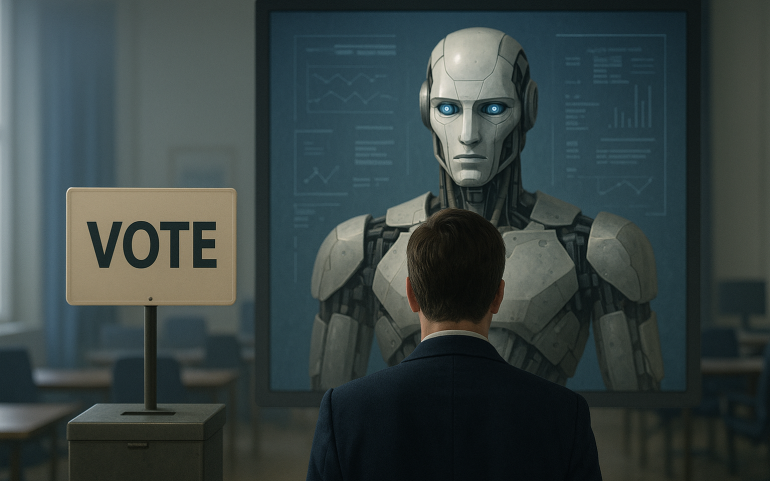Imagine walking into a cavernous government atrium, where polished floors echo each footstep and high ceilings are glazed by shifting light. Hidden behind the marble columns are shadowed control rooms humming with servers, their whispered computations shaping the fate of nations. You’re here not for a tour; you are inside the war room where AI meets politics, where algorithms are kingmakers, and democracy trembles in its wiring. The intersection of technology and governance raises questions about the role of ai in politics that we must address. The future of governance is intertwined with ai in politics.
The Election You Didn’t Know You Were Voting In
In this evolving landscape, understanding the implications of ai in politics is essential for voters and leaders alike.
Understanding the Role of AI in Politics
As we navigate this digital age, the implications of ai in politics grow more complex and critical.
Understanding the influence of ai in politics is essential for informed citizenship.
A roar of screens. On one wall, scrolling feeds monitor citizens’ digital behaviors: who clicked what, when, where. On another, real-time sentiment maps of districts cluster red and blue into shifting clouds. The CEO of a central social platform stands at a podium, watching a feed of micro-targeted ads streaming live into voters’ phones. Down the hall, campaign strategists consult AI models that simulate last-minute message tweaks: changing one word in a billboard ad could swing a 2 % margin.
This is no longer fiction: AI is embedded in political campaigns everywhere, from the U.S. to Moldova. In recent elections, disinformation campaigns powered by generative models have played puppet in geopolitics in Moldova, a surge of AI-generated narratives attacked the pro-European ruling bloc, deployed through spoofed news sites and amplification networks. (AP News) Meanwhile, researchers at the University of Washington randomly assigned participants to converse with chatbots that had different political biases; subjects gravitated toward the political slant of their bot, allowing their beliefs to shift with just a few prompts. (UW Homepage)
This is your new electorate, fragmented, influenced, and algorithmically steered.
When AI Becomes a Cabinet Member
You move into a surreal chamber. A hologram flickers to life. She is Diella, Albania’s so-called “AI minister.” She stands in traditional dress, her voice measured, promising incorruptibility, transparency, and incorruptible oversight of public procurement. To some, she is a bold experiment in depoliticizing corruption. To others, a propaganda gimmick hiding power behind code. Opposition critics call the move unconstitutional and warn AI systems are manipulable just like humans. (SvD.se)
As you watch her speech loop on screens, deputy ministers whisper: “Can she be audited? Who controls the code? What if she ‘learns’ politics of her own?” The logic of decision-making, left-right, pro-EU, anti-corruption, is now embedded in lines of code. Her presence in the chamber is a spectacle and a warning.
AI Models in the Halls of Power
You step into a secure wing behind the scenes. Federal contracts hang on the wall: the government is now buying access to AI models. xAI’s Grok is licensed to agencies through the GSA at symbolic rates, embedding private AI inside public administration. (Wall Street Journal) White House memos list AI and quantum computing as top research and development priorities. (Axios)
Policymakers argue: better predictive policing, more efficient social services, more intelligent urban planning. However, hidden in the code are assumptions about what constitutes “worthy” citizens, what constitutes risk, and what gets suppressed. The decisions are no longer purely political; they’re technical. And when a technical decision misfires, who’s accountable?
Democracy Under Algorithmic Siege
A dimly lit vault, your last stop. Rows of data voter profiles, psychographic models, engagement clusters. The AI safety alarms flash: Generative models pose a threat to the three pillars of democratic governance: representation, accountability, and trust. (Journal of Democracy) You see ghost accounts, deepfake videos, AI voices impersonating senators sending midnight texts. In one instance, an AI scammer posed as U.S. Secretary of State Marco Rubio, contacting officials to extract sensitive information. (The Guardian)
You feel the walls narrow. Who speaks truth when machines can lie? Who holds power when machines hold habits, networks, and narratives?
Then you awaken. But nothing changes; the machines are already in play.
Why This Matters
Because the moment you blinked, your beliefs, your vote, and your civic identity may have already been reshaped. This is not a distant future: it’s happening now in campaign war rooms, municipal procurement offices, national security contracts, and social media algorithms.

